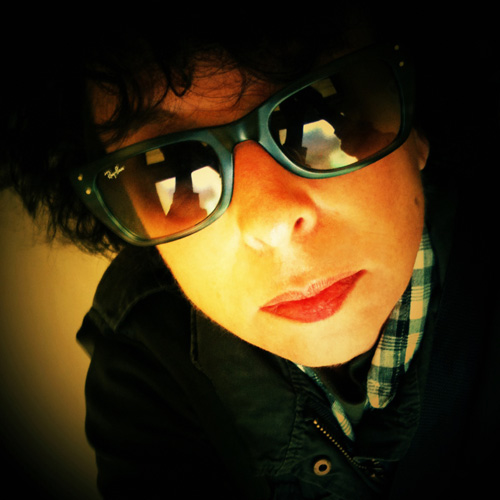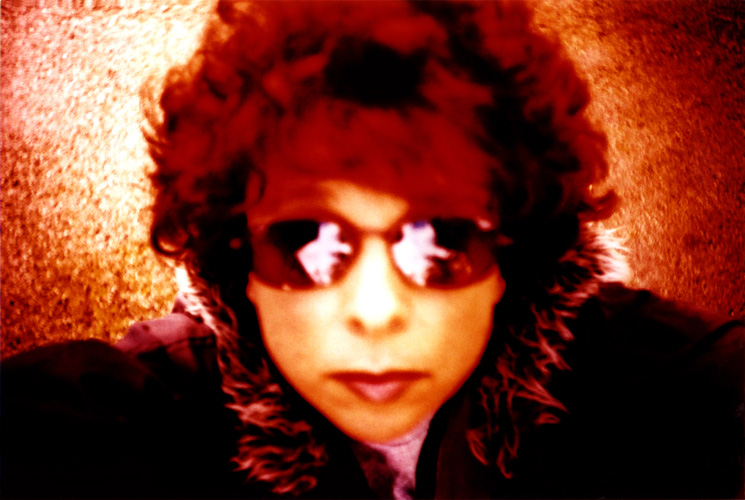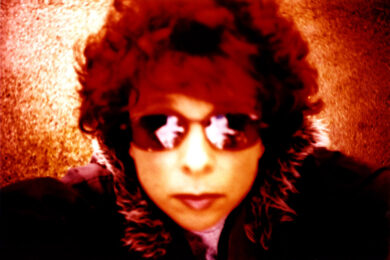"When we first got married, instead of buying a washing machine we bought an eight track and an Atari ST to run sequencing software on," says Colin Newman, sat in the living room of the house he shares with Malka Spigel in South West London. Downstairs, where most would park their small city car, is a room converted into a recording studio. Here, Spigel and Newman put together Every Day Is Like The First Day, her third solo album.
Spigel began her musical life in Israeli group Minimal Compact. She met Newman when he traveled to produce Minimal Compact’s 1985 LP, Raging Souls. The pair fell in love, and subsequently set up the swim~ label, formed the Immersion project together, and along with Max Franken (also of Minimal Compact) and Robin ‘Scanner’ Rimbaud, make up Githead, whose Landings LP was a Quietus favourite of 2009.
Collaboration, then, is very much part of Spigel and Newman’s musical life together, as is seen in their Hopper project, where they arrive in a foreign city and work with local musicians to write and stage a gig in just a couple of days. Although Every Day Is Like The First Day is a solo record in the sense that Spigel is in a figurehead role, it’s also a collaborative project in the involvement of Newman, and the impressive array of other musicians who make an appearance – guests include Johnny Marr, Factory Floor’s Nik Void, LoneLady, Andy Ramsay from Stereolab and Ronald Lippock of Tarwater and To Rococo Rot (read about the collaborations here). First, though, let’s go back to the beginning, to Tel Aviv, the late 1970s…
Malka Spigel: I couldn’t play when I was in Tel Aviv. I did buy a bass, but the strings were so far from the neck that I couldn’t press them down. I didn’t realise they had to be adjusted. Then I went to Amsterdam. One of the guys was a more knowledgeable musician. He played guitar and I started to play the bass. When we went to Amsterdam we used to go to Paradiso, and you see people who have lots of character but aren’t technically good. In Tel Aviv it was more whether you were good on your instrument or not, so I couldn’t imagine doing anything. In Amsterdam, they couldn’t play very well but they had a lot to say. It was totally inspiring.
How did Minimal Compact come out of that?
MS: In 1980 we moved [to Amsterdam], and started playing at home. A friend of Samy [Birnbach] had a record label in Brussels and we sent him a cassette and he liked it, and we suddenly became a band.
How did Israel react to Minimal Compact?
MS: At first they didn’t get it. We sang in English, and there’s only the local market. But after we got success on the outside, then suddenly they were into it, and partly because two of the members are very successful in Israel. Now, every time we play there are more people than the time before.
Colin Newman: In Europe Minimal were much bigger than Wire, because they toured so much. Wire was much more snobby, we had to have the van and the hotels.
MS: When I met him they used to have a tour bus and a tour manager and roadies, and would come back with no money…
CN: …we’d come back with no money, and she’d come back with pots!
MS: How you do it now is how we used to do it.
CN: I learned a lot from Malka.
What is your approach to collaboration?
MS: I wouldn’t like to be in a band where someone brought me the songs and I had to play them. It’s not a big ego thing, I like to be in a partnership from the beginning.
CN: Her thing is always about collaboration and this very equal way of working, and I thought ‘wouldn’t it be good conceptually to do a record where we didn’t plan anything at all’.
MS: He said ‘why don’t you do your album?’ I said ‘OK’, I didn’t even think about what it means. And then on Boxing Day we went to a studio (Press Play) with lots of weird instruments on a miserable industrial estate. We played, and I didn’t think about what it means. If we had gone to a different studio it would have been a different album. The beginning dictated where it went.
Were you comfortable with the idea of starting a record?
MS: I never think about what it means or what it’s going to bring. I’m comfortable with going to play, but I never think beyond it.
CN: You’re talking to somebody who, as soon as you put an instrument in her hands, she starts playing it. She doesn’t ask why…
MS: …or what…
CN: …she does. She was responsible for the starting of Githead, she just started playing the bassline that became the first song. Its that instantness that she has about making music.
MS: I listen to some artists and the music sounds calculated. I tend to like music that sounds like it really comes from the person. When you hear Robert Wyatt, it can only be Robert Wyatt. He’s doing himself, not anyone else.
What happened after the first studio session?
MS: We didn’t use any drums, which leaves it quite open. If you start with drums it dictates more. Colin tends to tidy things. We did some vocals, or ideas of vocals, which gives more idea of structure.
Eventually you got Ronald from Tarwater and To Rococo Rot to add drums…
MS: He plays with such feel. They come from East Germany, they were deprived as kids, and were so appreciated of music. They still have that. His parents bought him a cymbal, and that’s all he had for years. He still uses that cymbal. We also started ‘European Weather’ there and that track has a real Berlin vibe, We were sitting the studio, it’s in an apartment and you can see the street. Normally I don’t get ideas in advance, but this time the idea of the vocal and the words came.

Were all the collaborations quite informal? Did you want people to have a more instinctual response?
MS: We didn’t really say to anyone what to do, they had to get into it. I think there’s some kind of purity in the material that they responded with.
Do you think if you’d started in different ways you could have ended up with a completely different record? Or lots of completely different records?
MS: It dictated the next step and the next step and the next step. There was a folky feeling to start, Irish bouzouki and acoustic guitars. If we had started with more electronic instruments, it would have been completely different.
CN: I’d love to try and get those people together and try and make something all at once.
MS: Hmm.
CN: It might be more problematic than not. But we’ve made really firm friendships through this. Some of the people we knew, but this has made it different.
MS: It’s always touching because some of the collaborators feel really part of it, they really care how it’s going to do and whether people are going to hear it.
Do you think that because you two have this partnership, it makes it more unusual for the others to approach? Not only are you musical collaborators, you’re partners here…
MS: If you ask me how we did this album, it’s very hard for me to take it apart and remember, because we’re so easy together. I don’t really remember how it went. We bring this very laid back, very easy…
CN: There’s a lot of trust involved. Malka trusts me to fiddle with things to make it work.
MS: But also you give me a lot of space to express myself. When you’re in a band you have a lot of restrictions to space. This is your bit, don’t go over the line. There’s no such thing between us.
And that allows you to give more space and let the collaborators in.
MS: I used to be much more precious about my bit and their bit.
CN: I’m credited as producer and Malka is executive producer. Nobody ever lets me be called producer…
MS: That’s why I gave it to you
CN: She trusts me to make it all work together and there’s going to be nothing in that picture that she doesn’t want…
MS: That doesn’t mean you do it all! It’s quite blurry actually. But it’s true, he spends hours and hours cutting drums and things like that. I do everything fast and short and you pay attention to the detail.
CN: I get a big buzz out of making things sound great.
MS: You come up with concepts. You said ‘Let’s make your album’. I wouldn’t say, ‘Let’s make my album’ because if I was to suggest it I would be being selfish and forward.
CN: For sure it’s not a band! The past few days we’ve been playing Malka songs, just acoustic guitar and voice, and we’ve even been thinking that maybe we should do some gigs like that.
MS: Acoustic gigs! [chuckling]
CN: It’s a more intimate record in some ways, Every Day Is Like The First Day, although it’s quite big in terms of some of the arrangements. However, it’s not there to impress.
MS: I care more about moving than impressing.
CN: It’s an emotional journey [sarcastic].
MS: Are you drunk or something?
CN: I’m running out of things to say.
MS: Well be quiet then.
The title, does that sum up the process?
MS: Yes, and everything else I am into. It’s like being a child, in a way, the magic of the moment. It’s how I like to approach when I play bass. I never learned to play it or the notes, partly because I am lazy and partly because it feels like then it’s endless possibility, so I can play anywhere and anything. It’s about not having rules.
Lyrically, ‘Back In The Old City’ is very dreamlike, whereas ‘European Weather’ is more a snapshot. Your lyrics seem to capture different elements of your interest in photography.
MS: They’re probably the only two songs where I had the idea in advance. ‘Back In The Old City’ I had all these images and the words came instantly. ‘European Weather’ as well, I was sitting on a sofa at the back of the studio, looking at the street outside. I had a kind of image of where I was, a series of pictures. ‘Two Dimensions In A Single Frame’ is actually descriptions of my pictures. We were sitting by the computer in the studio, flicking through the images and writing the words as they came. When you have a "bright-eyed dog on a stony beach", that was when we were with Wire on the beach in Rottingdean, and I took a picture of this dog that was actually smiling. It’s very linked – the way I do photography is the same.
It really gives the project an identity
CN: We had thought about having a project name for it, but the trouble with that would be it would take away from Malka. It would be us rather than her. It is her record.
MS: The project name is me.
You can buy Malka Spigel’s Every Day Is Like The First Day here



